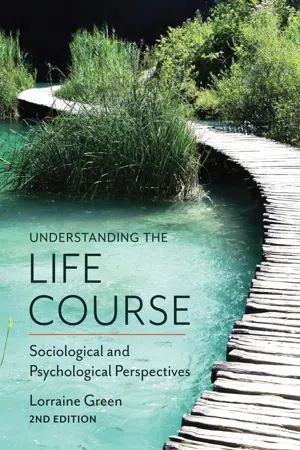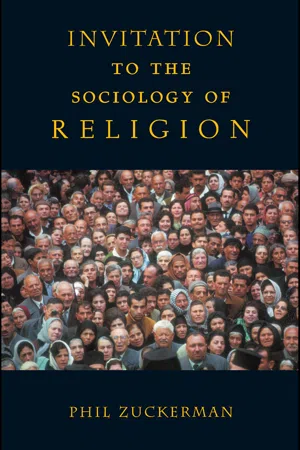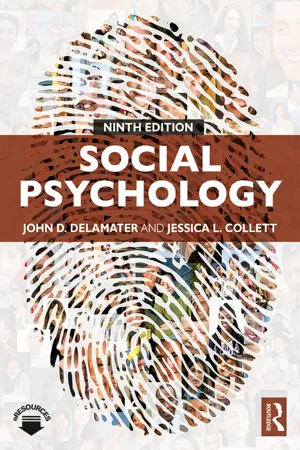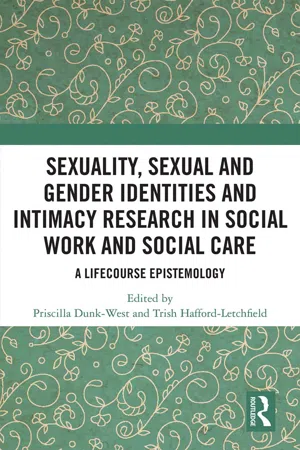Social Sciences
Sociology of Personal Life
The sociology of personal life examines how individuals experience and navigate their personal relationships, emotions, and identities within the broader social context. It explores the impact of social structures and cultural norms on personal experiences, and how individuals negotiate their personal lives in relation to societal expectations. This field of study sheds light on the complex interplay between personal experiences and social forces.
Written by Perlego with AI-assistance
Related key terms
5 Key excerpts on "Sociology of Personal Life"
- eBook - ePub
- Carol Smart(Author)
- 2013(Publication Date)
- Polity(Publisher)
There is also the potential to overcome the older distinctions made between private and public spheres which have conceptualized family life as a distinct place or institution separate from other social spaces and structures. Personal life is lived in many different places and spaces, it is cumulative (through memory, history and the passage of time) and it forms a range of connections, thus making it flexible rather than brittle and breakable. So personal life is not so concerned with boundary marking and provides the possibility of tracing its flows through systems of education, or work, or elsewhere. 7 The concept also gives recognition to those areas of life which used to be slightly below the sociological radar. Thus personal life includes issues of sexuality, bodies, emotions, intimacy and can bring them together, creating a whole that is greater than its parts, rather than treating them as separate subfields of the sociological discipline. 8 Finally, personal life as a concept does not invoke the white, middle-class, heterosexual family in the way that, historically at least, the concept of ‘the family’ has. This means that important dimensions of class, ethnicity, religion, sexuality, gender, and disability can be written through the narrative and given significance through attentiveness not only to difference but by reference to cultural tradition, habitus, memories, generational transmission and emotion. This is not to imply that all these elements can or should be achieved all the time but shifting away from the dominant concept of the family to this broader sphere of social and emotional (inter)relationships opens up new conceptual configurations.These points are suggestive of the value of reconfiguring the field. But this does not mean that terms such as ‘family’ or ‘family life’ should be banned or that the notions of kinship and friendship should be collapsed into a formless sludge. These ideas about personal life are intended to provide a conceptual orientation and potential toolbox rather than a rigid, rule-bound manifesto. Among the inevitable limitations with the concept, the most obvious is that its scope can be seen as too wide and it can appear to include anything and everything that pertains to a person. With more traditional concepts such as the family there were clear conceptual boundaries between ‘it’ and other institutions. But the comfort achieved by having conceptual boundaries has been at the cost of misrepresenting the ways in which personal life is lived and there are increasing demands for an understanding of fluidity. Morgan (1996) addressed this problem in the development of his ideas about family practices. He argues that ‘a growing sense of fluidity’ is apparent in arange of sociological fields such that the previously discrete areas of ‘family’, ‘work’, ‘leisure’ and so on are not sealed off from one another. Rather Morgan suggests that one might start at a given point, but will inevitably cross over these other spaces. He deploys the metaphor of the kaleidoscope with ‘the emphasis on shifting patterns of relationships’ (1996: 187) to express the kind of realities that sociology seeks to represent and understand. He states: - eBook - ePub
Understanding the Life Course
Sociological and Psychological Perspectives
- Lorraine Green(Author)
- 2016(Publication Date)
- Polity(Publisher)
Mayer (2003) views life course sociology as the process of individual lives becoming embedded within social structures through a socio-historical multi-level process, with a particular focus on social positions and roles. He contends that sociologists search for three mechanisms to account for the shape and form life courses take. The first mechanism revolves around how institutions shape people’s lives. For example, in the UK, education from the age of 5 to 16 is compulsory. It is scheduled at particular times, involves particular tasks and activities at different ages, often streams students according to ability and ideally results in skills and qualifications. Employment law defines who is gainfully in work or unemployed, regulates minimum conditions, hours worked and wages paid. Family law defines who is regarded as married, divorced, single or in an otherwise acceptable union, and who is the legal guardian or carer of a child. The second mechanism focuses on trajectories and transitions. It ascertains whether certain transitions – for example, from education into first employment or from being single to being married – are made at certain ages or within a certain time span, and whether certain precedents earlier in individuals’ biographies – for example, single parenthood – shape the timing or even the possibility of achieving certain outcomes. The third mechanism is associated with individuals being divided into cohorts and affected by both preceding and succeeding cohorts which may impact individual opportunities more than individual or situational conditions (Macunevic, 1999). For example, one’s likelihood of finding a partner may vary over time depending on the numbers, behaviour, desires and communication networks of those searching at the same time - eBook - ePub
- Phil Zuckerman(Author)
- 2010(Publication Date)
- Routledge(Publisher)
Schools. The military. Corporations. Police departments. City hall. The government. Hospitals. Prisons. The family. Courts. Marriage. Industries. The media. Sports. The economy. Political systems. The workplace. The welfare system. And a whole lot more. Sociologists look at the ways certain social structures and institutions frame and shape our lives, greatly affecting where we live, how we live, who we live with—even how long we live.4. Sociologists study social patterns .
Social patterns refer to everything from divorce rates to fashion trends, crime rates to how people kiss, rates of drug usage to what people eat. Personally, I like to ponder the social patterns (those primarily concerning race and gender) that can be observed at Los Angeles International Airport: the people who check bags on the curbside are almost always middle-aged black men. The flight attendants are almost always white women. The people working by the luggage x-ray machines are almost always young black women. The pilots are almost always white men. Why? Understanding and explaining such social patterns—how it is that certain jobs become gender and/or racially segregated, for instance—is a typical sociological concern.5. Sociologists understand that an individual can be truly understood only within his or her sociohistorical context .
From reading assertions 1 to 4, one might get the impression that sociologists don’t concern themselves with individuals. This is simply not so. Sociologists are very much concerned with individuals. But we do approach our study of the individual in a special, sociological way. To put it simply, we believe that the individual only “makes sense” when his or her social environment is taken into account. Though we are all individuals, we are individuals existing in specific points in history, in specific countries, in specific neighborhoods, in specific economies, in specific families. Where, when, and with whom we as individuals find ourselves living are all incredibly important factors in shaping our personal lives and identities. The way every individual dresses, the food she or he eats, the music she or he likes, his or her political opinions, the way she or he experiences love, the way she or he communicates, and so on, are all directly linked to specific sociohistorical circumstances beyond any one individual’s control, or even consciousness. - No longer available |Learn more
- John D. DeLamater, Jessica L. Collett(Authors)
- 2018(Publication Date)
- Routledge(Publisher)
Sociology is the scientific study of human society. It examines social institutions (family, religion, politics), stratification within society (class structure, race and ethnicity, gender roles), basic social processes (socialization, deviance, social control), and the structure of social units (groups, networks, formal organizations, bureaucracies).In contrast, psychology is the scientific study of the individual and of individual behavior. Although this behavior may be social in character, it need not be. Psychology addresses such topics as human learning, perception, memory, intelligence, emotion, motivation, and personality.Social psychology bridges sociology and psychology. In the mid-twentieth century, early in the history of social psychology, sociologists and psychologists worked closely together in departments and on research. In fact, top programs offered degrees in “Social Relations” or “Social Psychology” rather than Sociology or Psychology. However, over time, the interests of sociological social psychologists and psychological social psychologists diverged somewhat. For a period, collaboration became rather uncommon. Although that is beginning to change and more sociological and psychological social psychologists are collaborating again (for example, the work of Feinberg, Willer, and colleagues described in Figure 10.2 and Box 11.1 of this text), most students still earn degrees in one of the two disciplines with a specialization or concentration in social psychology. That said, many still see social psychology as interdisciplinary.Both sociologists and psychologists have contributed to social psychological knowledge. Sociological social psychologists use surveys, experiments, and observational techniques to gather data. These investigators are most interested in the relationships between individuals and the groups to which they belong. They emphasize such processes as socialization, conformity and deviance, social interaction, self-presentation, within-group processes, leadership, and cooperation and competition. Social psychologists working in the psychological tradition rely heavily on laboratory experimental methodology but increasingly use surveys and questionnaires. They are much less likely than sociological social psychologists to use observational methods outside the laboratory. Their primary concern is how social stimuli (often other persons) affect an individual’s behavior and internal states. They emphasize such topics as the self, person perception and attribution, attitudes and attitude change, personality differences in social behavior, social learning and modeling, altruism and aggression, and interpersonal attraction. - eBook - ePub
Sexuality, Sexual and Gender Identities and Intimacy Research in Social Work and Social Care
A Lifecourse Epistemology
- Priscilla Dunk-West, Trish Hafford-Letchfield(Authors)
- 2018(Publication Date)
- Routledge(Publisher)
In this chapter, we provide an orientation to the subject matter contained in this edited collection and we begin to explore some of the concepts central to the themes in this book. First, it is important to outline the reason for the arrangement of the chapters: thus, we now consider what role the life course approach plays in such an arrangement.The life course approach
We know from both sociology (Hunt, 2016) and psychology (Elder, 1998) that questions and expressions of identity are pertinent throughout the life course. One of the benefits of a life course perspective is that it accounts for social, historical and biographical contexts in theorising about life stages (Elder, 1998). A life course approach sees life from beginning to end: birth to death. In social work, developmental theories not only inform childhood, but apply across the life span. Informed by theorists such as Erikson (1950, 1968), such a lens views age as bringing about a particular ‘stage’ tied up with identity. If we consider the role of intimacy, relationships, families, sexual and gender identities across the life course and in relation to social expectations and biographical events, we can begin to see that these issues are manifest throughout the life span in particular iterations. For example, from birth, the notion of family, being parented and the learning of social relationships occurs (Mead, 1913).Sexualities and beyond
Up until now, sexuality has been treated as a specialist topic or area of practice whereas we contend that issues to do with sexual and gender identity cut across all areas of social work, and to relegate it to any specialist topic, stage of the life course or single field of practice would be very misleading. Sexuality is an umbrella term that relates to the private dimension in which people live out their sexual, intimate and/or emotional desires. Sexual identity, on the other hand, suggests a stance in orientation, it provokes categorical discernment. Thus, sexual and gender identities relate to defining the nature of one’s attractions and desires, gendered relationships and include terms that pronounce this, including lesbian, gay, bisexual, queer, heterosexual, cis, questioning and many others. There are also broader terms which relate to sexuality and gender. Intimacy, friendships and relationships are examples that are explored in this edited collection. The term intimacy can be associated with sexual relationships as well as used to describe the closeness inherent to non-sexual relationships. The fact that this term has evolved to include the latter speaks to the shifting nature of theorising brought about through historical, social and political movements. Thus:
Index pages curate the most relevant extracts from our library of academic textbooks. They’ve been created using an in-house natural language model (NLM), each adding context and meaning to key research topics.




